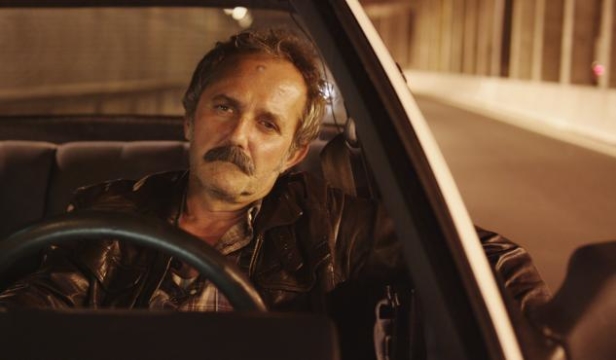“You know what? There’s a cool way to pass time. We can play some game. What do you say? A little bit of night fun. Alright, I’ll go first. I spy with my little eye…”
So says one man to another near the beginning of Dhogs, introducing its two key themes: game-playing, and the male gaze. The two men are standing side-by-side in a locker room, both staring out in the same direction, and both apparently filling in time while waiting for something to happen. They are also themselves a spectacle for an audience which we see seated in a theatre in the dark (just like us) and watching. Initially mysterious cutaways reveal a little boy (Roi Gantes), and a bearded man (Xosé López), also looking at something (this is explained at the end). Indeed, there are so many layers of spectatorship in Dhogs – whether by viewers, bystanders, screens or even by a painting of faces staring out over the bed in a hotel room – that it is easy to get lost in its labyrinth of constantly shifting perspectives. The point-of-view here is as mercurial as some of the characters who occasionally share it – a stony-faced taxi driver (Antonio Durán ‘Morris’), a nerdy petrol-station cashier (Suso López) and his alcoholic mother (María Costas), a ‘John Doe’ on the prowl (Iván Marcos), a ‘rabbit-man’ (Miguel de Lira) living out in the desert with his sick dog – all of whom adopt different kinds of mask and behave in deeply unpredictable ways.
The film is split into three formally headed chapters – Taxi, Dogs, Dhogs – unified by the character of Álex (Melania Cruz) who goes from sexually confident one night stand for businessman Ramón (Carlos Blanco) to hapless, brutalised victim to aggressive avenger. Yet if all this sounds like a familiar rape-revenge scenario, first-time writer/director/editor Andrès Goteira constantly disrupts the action wth alienation effects designed to maximise the viewers’ discomfort with their own acts of viewing, and with the sadomasochistic range of identifications that such voyeurism entails. Here looking and desiring come horrifically intertwined.
Text at the film’s beginning presents a formal division between dogs (‘submissive and obedient creatures’) and hogs (‘dirty and wicked creatures’) – a division which is irrationally recombined in the film’s title. By the time Dhogs has completed its desultory display of bestial behaviours, you may be unsure where you yourself fall on the fluid moral spectrum of its funny games – but you can be sure that this astonishing debut offers an uncompromising, challenging kaleidoscope of the human animal in a postmodern, mediated age where agency and passivity, kindness and abuse, heroism and villainy are just choices on a menu of vicarious audiovisual entertainments.
here is so much to savour in this astonishing film’s carefully calibrated framing, disorienting sound design, ludic leaps in focalisation, and reversible riffs on Irreversible (2003) – but it will also leave viewers deeply anxious about who else might at any time be watching and in control.
